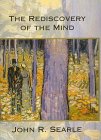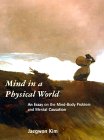|
Quality Christian Internet: Dr. Reppert, of what importance is the "Argument from Reason", in your opinion? Why should thinking Christians and non-Christians be interested in it? Dr. Victor Reppert: The Argument from Reason does two things. First of all, it challenges the primary paradigm that has stood in the philosophy of mind for many years, and that is the physicalist paradigm. If the Argument from Reason is correct, any attempt to provide a complete account of cognition in physicalist terms is bound to fail, because in the last analysis it will show that reasoning is really something other than reasoning, and is not caused in the way that reasoning must be caused if it is worthy of the name. [In other words,] I think that the physicalists, in using reason, presuppose it to be what common sense suggests that it is, and that requires that their thoughts be about something, that they be causally efficacious in virtue of their content, that it is possible to perceive logical relationships, and that the obtaining of those logical relationships has something to do with what beliefs they hold. With respect to some of their beliefs they must presuppose that they inferred them from others, especially given the importance of inference in science and philosophy. But in analyzing reason in terms of something nonrational (which is what they are committed to doing) they invariably end up changing the subject and talking about feedback loops, or inputs and outputs, and in one way or another the reality of reason gets hidden. [Daniel] Dennett, for instance, says that our beliefs are what would be attributed to us from what he calls the intentional stance, but that presupposes that we are the kinds of beings who can take the intentional stance, which is precisely what he is trying to explain. 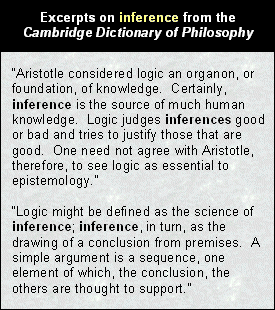
One of the results of the argument is that if what we mean by "material thing" is something subject to a mechanistic or nonpurposive explanation in the final analysis, then we as humans are not purely material things. Second, although materialism is not the only form of atheism, it is certainly what you should expect to find true if the universe (at least before humans came on the scene) is a self-sufficient physical system. I think the most logical explanation for why we can reason is that the universe itself, and our minds, were made in the image of a rational God. Now I am not in the business of looking for one decisive argument to blow the nonbeliever away. The case on both sides is, of course, cumulative. If I were firmly convinced, on other grounds, that materialism was true, I would probably look at the data provided by the Argument from Reason and say, "There's got to be a naturalistic explanation for this out there somewhere." But our mental lives provide us with many elements (consciousness1, our sense of personal identity, the aboutness of our thought, etc.) that seem to make more sense if materialism is denied and some other view of the mind is accepted.
This argument persuaded [C. S.] Lewis to reject naturalism in favor of
idealism. It of course did not cause a conversion to Christianity, but
it did help make that possible. People have pulled Lewis's life apart on
everything from his love life to his speaking voice, and lots of people
are good at repeating Lewis's arguments, but this argument in particular
seems under-discussed, underdeveloped, and underutilized. For every page
of serious discussion of what the exchange with Elizabeth Anscombe was
all about, there are hundreds devoted to his reaction to
it.2 So I would
say serious discussion of this argument should be of concern to anyone
interested in Christian apologists like William Lane Craig have done a great deal to show that the naturalistic worldview has difficulties in coming to terms with the Big Bang theory3; I think there are problems equally serious or more so in coming to terms with our powers of reasoning. This argument covers a lot of apologetic ground, it would seem, giving evidence for something non-material within us - something we might call the mind or soul, and at the same time identifying a serious problem for naturalism, if it can't account for reasoning; kind of a "ground floor" requirement of worldviews. Lewis also used it to argue for something else: miracles. Before we discuss his part in this in more detail, would you highlight for us the history of the Argument from Reason? Who was the first person to recognize it and where did it go from there? VR: The Argument from Reason, of course, has predecessors; the argument goes back at least to Kant and some would even say all the way back to Plato. Two pre-Lewis sources for the argument are James Bissett Pratt's Matter and Spirit from 1922, and Prime Minister Arthur Balfour's The Foundations of Belief, on pp. 284-290 of my 1906 edition (the book was initially published in 1905). I don't know if Lewis read Pratt, but I do remember seeing The Foundations of Belief in Lewis's library at Wheaton and he did refer to Balfour's later Theism and Humanism as "a book too little read." When I was writing my dissertation at the University of Illinois on this argument, my advisor ran across an old G. E. Moore essay in which Moore attacks Balfour in much the way that Anscombe attacked Lewis. So you can't call Lewis the inventor of the Argument from Reason, [but] he popularized it and refined it in the face of philosophical criticism by Anscombe. How did you first become interested in the Argument from Reason? 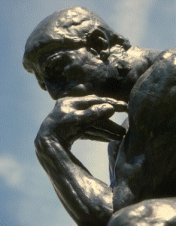
VR: I first got interested in the argument after a conversion experience at age 18. I had read some of Bertrand Russell's anti-religious writings at that time. Russell not only argued that the Christian claims were false, he also maintained that Christians formed their beliefs irrationally, being influenced by tradition, fear, and their wishes to believe something for which there is no good evidence. Lewis, on the other hand described his own conversion to Theism as having taken place against his wishes, because of the good reason he found to believe in God and later in Christianity. I take it Russell would not have been impressed by this, and would have argued psychoanalytically that although Lewis might say he believed for good reasons, and might believe that this is why he believed, he really of course was engaged in wishful thinking. But if you disbelieve Lewis's report of such matters, then why should you accept Russell's or anyone else's reports of why they believe or disbelieve anything? More to the point we are discussing here, while Russell and those like him claim to be more rational than believers, the argument from reason shows that that very capacity to reason is itself a reason to think that naturalism is false. I was surprised to learn, in studying the major arguments for the existence of God, that the argument from reason is typically not included. Some people treat it as a version of the design argument, and in a way it is in that category, but it has some unique characteristics that do not come up in typical design-argument discussions. Later I found a sizable literature on this line of argument while researching the free will question for my Master's thesis at Arizona State University. When I arrived as a first-year doctoral candidate I took a course on Physicalism with Dr. Hugh Chandler. I happened to mention the Lewis-style argument in a paper, and Dr. Chandler wrote a note saying that this was a bad argument and that I should read Anscombe. I had always wanted to, but the Socratic Digest issue was difficult to find. Fortunately, Anscombe had published a volume of her papers, including the reply to Lewis a commentary on the revised chapter. After awhile I became persuaded that I could show how Lewis's argument could overcome Anscombe's objections, and my paper "The Lewis-Anscombe Controversy: A Discussion of the Issues" came out of that. I really appreciate your point about Lewis's journey to faith and, in contrast, Russell's framing of the believer's thinking. The Socratic Digest you mentioned - was that the minutes or journal of Lewis's Socratic Club? VR: The Socratic Digest was the journal of the Oxford Socratic Club. The Socratic was an open debating society that Lewis founded to discuss the truth-claims of Christianity. In its heyday it attracted the top religious thinkers of Oxford. I think it included some minutes of the meetings and also some papers, like Anscombe's. I think we should address Lewis's formulation of the argument before we go any further. There were two versions of Miracles, the second written in response to Elizabeth Anscombe's criticisms, as you've already noted. Can you extract, from those texts, a quote or two that you believe best captures the heart of the Argument from Reason? VR: Lewis's argument from the original chapter 3 of Miracles goes as follows:
Now someone reading this might be confused about what it means to say that a thought is valid, so we might substitute the words "belief" and "justified" for "thought" and "valid". The result would be that the belief "Naturalism is true" cannot be both justified and true, hence no one could ever know that naturalism is true even if it is true, and further, no one could know anything else if naturalism is true. So if (as we must) assume that there is knowledge, we must assume also that naturalism is false. Lewis's revised argument begins much the same as the previous argument, distinguishes between connection via cause and effect and connection by ground and consequent. The key passage, to me, is on page 16 of my edition: 
But even if grounds do exist, what exactly have they got to do with the actual occurrence of the belief as a psychological event? If it is an event, it must be caused. It must in fact be simply one link in a causal chain which stretches back to the beginning and forward to the end of time. How could such a trifle as lack of logical grounds prevent the belief's occurrence or how could the existence of grounds promote it?fn What Lewis claims is that if there are reasons to believe something, if naturalism is true, they would have to be irrelevant to the actual production of beliefs. No one could ever believe in naturalism because there are good arguments for naturalism. So, if I can offer an example that we might sink our teeth into a bit, take this syllogism in the context of a person's thought life:
If I'm understanding you correctly, Lewis would say that, in the naturalist paradigm, Would you agree with that? VR: I think before I proceed any further I have to define what I think a consistent naturalist is going to have to accept. Often advocates of this argument are accused of putting up for criticism a straw man; some extreme form of materialism that no one actually holds. But if there are no supernatural beings, we know what nature was like before the earth was formed. Matter moved about in accordance with the laws of physics, without any purpose whatsoever. For the consistent naturalist "purpose" has to be an evolutionary by-product that is analyzed out at the basic level of analysis, that of physics. So a consistent naturalist has to hold 1) The Closure Thesis: Physics is a closed system; nothing other than physics explains where any particle is at any time. 2) The Mechanism Thesis: Physics is mechanistic; purposes don't ultimately explain where the particles go, and 3) The Supervenience Thesis: All other states in space and time (chemical, biological, psychological. sociological, economic) are the way they are because physics is the way it is. If someone wishes to deny this and still be a naturalist, we have to ask him how he thinks these "strange" states that violate these theses came into being, given the fact that physical causation is the basic way in which things get done in a physical world. This definition, by the way, is compatible with eliminative materialism, reductive materialism, and non-reductive materialism, so it is hardly a straw man. I'm not sure that it was obvious to Lewis (it took quite awhile for me to figure it out) that there are several "arguments from reason" rather than just one. Physicalists are hard put even to give an account of what it is for a thought to be "about" Socrates, or mortality, or what have you. All the physical information that can be brought forward about a person cannot, it seems to me, tell you for certain what that person's thought is about. Thus, following the naturalistic philosopher W. V. O. Quine, a consistent physicalist is forced into what seems to me to be the absurd position of saying that there is no fact of the matter as to what someone's thought is about. 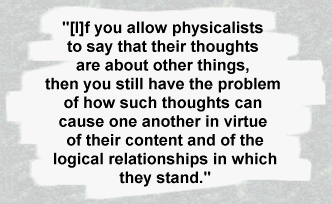
But if you allow physicalists to say that their thoughts are about other things, then you still have the problem of how such thoughts can cause one another in virtue of their content and of the logical relationships in which they stand. How do we perceive logical relationships (which have no location), and how is this relevant to the production of beliefs? So, in the syllogism case, how could the logical connection between the premises and the conclusion promote, in the mind of the reasoner, the correct belief as opposed to the incorrect belief. It isn't enough to say that true beliefs will, of course, be favored by natural selection. Natural selection selects physical systems that produce the behavior generated by "true beliefs." If physicalism doesn't exclude the possibility that logical relationships can be relevant and that content can be relevant to what we think, then the Darwinian move can be made, but that is precisely what I challenge. So if physicalism is true, and it follows from this that logical relationships are irrelevant to what actually happens in the world, then there is no reason why nature should prefer a valid syllogism to an invalid one. (See also Hasker's discussion of mental causation in The Emergent Self). I think this line of argument corresponds most closely with what Lewis had in mind. So I think he would agree with the way you are presenting his argument in your question. Finally, reason seems to be a much more powerful and precise tool than would have been relevant to our survival when, according to evolution, the basic characteristics of human beings were selected for (back when we were coming out of the trees, supposedly). So Balfour argued that natural selection could account for the reliability of our thoughts only insofar as they were relevant to its "coping" function, and would not account for the general reliability of reasoning. This is something Thomas Nagel worries about in his book The Last Word, though I am not as confident of this line of argument as I am of the first two. What were Anscombe's objections to Lewis's original argument? VR: Anscombe maintained that the Lewis's argument was faulty for three reasons. First, she maintained that while Lewis maintained that naturalism has the consequence that all thoughts are the result of irrational causes, there is an important distinction to be drawn between irrational causes on the one hand (like wishful thinking, yellow jaundice, prejudice, etc.) which tend to produce false beliefs, and nonrational causes, which are just physical causes such as brain states. While naturalism has the implication that all thoughts are the result of nonrational causes, it does not follow that all thoughts are the result of irrational causes. Claiming that all thoughts are the result of irrational causes would be fatal to a position, saying that they were the result of nonrational causes may not be. But, as Lewis pointed out in his revision, if all thoughts are the result of nonrational causes such that, given those causes, it is impossible that the particular thought should not occur, it is incompatible with the claim that some particular thought is produced by the good reasons there are for believing it. If the thought the Socrates is a man and that all men are mortal does not produce the belief that Socrates is mortal, then I cannot be said to have inferred the conclusion from the premises. Rational inference (as opposed to other types of justified belief) seems to require rational causes, and if it is produced by nonrational causes then it cannot have been rationally inferred. Second, Anscombe argued that the only way we could understand some reasoning process as a valid inference is if we had already drawn a contrast between valid and invalid reasoning, and hence it is not possible to ask whether all reasoning might be invalid in the final analysis. But a properly structured version of Lewis's argument does not ask whether all reasoning might be invalid, it assumes that there are valid inferences and asks what that tells us about the way the world is. Even if we cannot coherently ask if reasoning is valid, we might nonetheless be able to ask what we must assume in order for reasoning to be valid. And, according to Lewis, the assumptions needed for the validity of reasoning rule out a naturalistic account of how reasoning occurs. Finally, Anscombe maintained that Lewis's argument trades on ambiguities in the uses of the terms "Why", "because" and "explanation." There are, according to Anscombe, four different types of explanations. You can explain why you draw a conclusion, and you explain the logic of the argument. That is one type of explanation that has nothing to do with the causes of your belief. Then we might ask "Yes, I see why the conclusion follows from the premises, but why is that why you believe it?" And you might indicate that such and such a reason is why you believe something. And then we might ask how, as a matter of personal history, you came to believe something, and you might produce a different answer, since how you came to believe something might be different from why you still believe it now. And finally, there are the naturalistic explanations offered for your belief in terms of neurophysiology or evolutionary biology. But, Anscombe says, since these explanations answer different questions about why someone believes something, there can be no conflict between, say, a neurophysiological account of the sufficient causes of your belief, and the reasons you give for believing as you do. But if naturalistic, non-rational causes provide a comprehensive account of why all the basic particles are in the positions that they are in, how is it possible for you to believe what you do because there good reasons to believe it? Anscombe, influenced by Wittgenstein, thought that reasons-explanation were not causal explanations, but if we attend closely to what we are saying when we say that we believe something because we have inferred it, then reasons have to be relevant to how beliefs are produced, and Anscombe and Wittgenstein were simply wrong about this. But if the physical is closed, and my beliefs affect the physical world, then what goes on with my beliefs must be explainable in terms of the closed mechanistic order in which reasons are irrelevant. This is what Lewis called the Cardinal Difficulty with naturalism, and in response Anscombe admitted that we do not have a (naturalistic) answer to Lewis's question "Even if grounds do exist, what exactly have they got to do with belief as a psychological event?" There has been a renewed interest in the Argument from Reason lately. Can you give us a quick overview of recent developments? 
VR:
The argument has been discussed in some form or other over the
last 50 years. J. R. Lucas
wrote an book called Freedom of the Will in - I
think - 1970, using Godel's mathematics to attack mechanistic
materialism. People like James Jordan, Richard Purtill, and
William Hasker
have also defended versions of the argument. I wrote my
dissertation on the argument, which is called "Physical Causes and
Rational Belief: A Problem for Materialism" at the University of
Illinois, and completed it in 1989. But two recent developments have
given this argument serious consideration.
But what is doing a great deal to fuel interest in this argument is the fact that philosophers who are not advocates of the argument and who are themselves not theists or dualists are presenting arguments in defense of claims that support the argument. Three philosophers of this sort come to mind: John Searle, Thomas Nagel, and Jaegwon Kim. I recommend Searle's Re-Discovery of the Mind, Nagel's The Last Word, and Kim's Supervenience and Mind or Mind in a Physical World : Essays on the Mind-Body Problem and Mental Causation. Kim, for example, defends a Principle of Explanatory Exclusion according to which there cannot be two complete, independent explanations of the same phenomena. Since critics of the argument have frequently relied on claiming that rational and physical explanations are compatible, the Principle of Explanatory Exclusion is going to put a very serious cramp in the naturalist's style when they attempt to provide a response. Searle is a trenchant critic of functionalist attempts to resolve the mind-body problem, and Nagel really puts a version of the argument forward for consideration, even though he is not prepared to accept it himself. Even though none of these philosophers wants to abandon naturalism entirely, they pose a lot of tough questions for naturalistic positions and open the door for people like me to say that the reason these problems are so tough is that naturalism just isn't true.
And you've been in dialogue with some naturalists more recently, too. VR: Yes, the latest round of dialogue concerning the Argument from Reason began in 1998 when I posted my paper, "The Argument from Reason" to the Secular Web. It's a long story how it got there and not on some Christian website, but I would like to draw attention to the fact that non-believers are taking a more serious interest in responding to Christian apologetics now than they did while I was in graduate school, and I think that that is a good thing, and a golden opportunity to respond effectively. It is going to be more challenging for Christians to respond to this, but the more serious rational dialogue on these matters takes place the better for us, (assuming of course, that reason is ultimately on our side!) At least it is better than the smears and dismissals I was used to hearing from a lot of professional philosophers when I was in graduate school in the 1980s! In the Spring-Summer 1999 issue of the journal Philo a slightly revised version of the same paper appeared, with a response from Jim Lippard. Philo is the journal of the Society of Humanist Philosophers, so it's overall ideology is the same as the Secular Web. Keith Parsons, then the editor of Philo, presented some arguments against my conclusions in the course of a review of Thomas Nagel's The Last Word, so in the Spring-Summer 2000 issue I wrote "Reply to Parsons and Lippard," and Keith wrote the first full-dress attempt to refute my argument. I am currently submitting my response to Parsons not to Philo but to a Christian philosophy journal, because I think more Christian philosophers need to be familiarized with this argument and related issues. There are some Christians who want to accept physicalist philosophies of mind; although such philosophies are popular amongst secular philosophers, I think it is a mistake to embrace such views, given both the theological problems they have and what I think are good philosophical arguments against them, like, for instance, the Argument from Reason. I'm also trying to put a book of my own together -- C. S. Lewis's Dangerous Idea (IVPress) -- on the argument, along with an anthology of essays by various philosophers supporting it. If this interview is any indication, I'm sure those works will be fascinating reading! Any concluding remarks to our interview? VR: One thing I might add is that I think that a lot of naturalists reject this argument not because they have some great account of mental causation tor rational inference that they think works, but rather, because they think that rejecting a comprehensively mechanistic philosophy undermines the scientific enterprise in some way, and denies what the last few decades of cognitive science have taught us about the role of the brain in cognition. But I think that we can still learn a great deal about the mind through scientific study without committing ourselves to a comprehensive materialist philosophy that accounts for rational inference in terms of the nonrational motion of matter. Second, it seems to me at least possible that cognitive science and even artificial intelligence research could go on from an Intelligent Design perspective, and that there is nothing pseudoscientific about this. Of course cognition depends heavily on the brain, but unless we can perceive logical connections, then there can be no brain science. And if I am right, the perception of a logical connection cannot be a mechanistic process, otherwise it would not be a perception of a logical connection. Thank you, Dr. Reppert, for taking the time to explain the history and theory behind the "Argument from Reason."
1See, for example, "What it is like to be a bat?", by Thomas Nagel. Naturalist philosopher David Papineau, on the other hand, is compelled to write consciousness out of existence in his book on philosophy of mind
2The book
A Christian for All Christians: Essays in Honor of
3See Craig's
virtual office
at Leadership University for more information on
theism and Big Bang cosmology.
Footnotes, links, and graphics were added by the interviewer. |
 First,
First,
